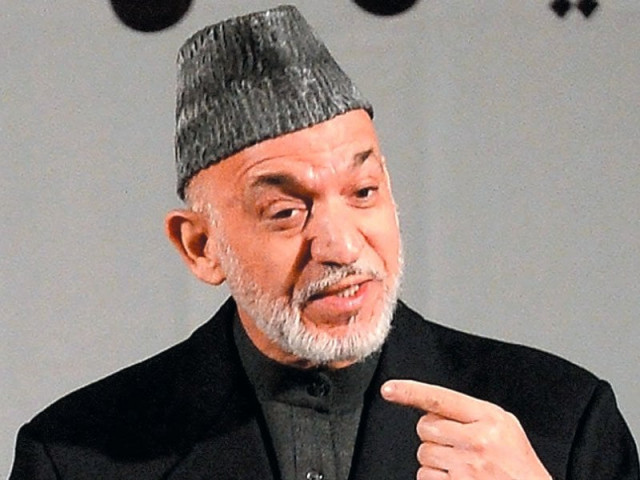Neighbourhood watch : Karzai refused Qatar talks in light of ‘foreign conspiracies’
Suspends negotiations with the US regarding 2014 endgame.

Karzai said the Qatar office was inaugurated in violation of “agreements”. PHOTO: FILE
Beleaguered Afghan President Hamid Karzai has asserted he foiled “foreign conspiracies” in Qatar days after refusing to send members of his peace council to the gulf state for possible talks with the Taliban.
Speaking at his weekly radio address on Thursday, Karzai said the Qatar office was inaugurated in violation of “agreements”. Although Afghanistan and the United States had agreed on opening the office, the situation was different at the time of its formal inauguration, he claimed.
However, Karzai failed to mention who the conspirators were and what their plans had been.
The United States, Afghanistan, Qatar and the Taliban had been involved in a dialogue regarding the long-awaited opening of the Taliban office in Doha. Pakistan claims it has facilitated the process, but the country’s spokesperson could not give a direct reply explaining how exactly Islamabad facilitated the initiative.
Despite repeatedly calling for peace talks, Karzai was quick to raise a hue and cry when the office was inaugurated on June 18, alleging it was in place to install a parallel government.
The US-backed regime raised objections to the Taliban’s white flag and a plaque bearing the words ‘Islamic Emirate of Afghanistan’, which corresponded to a name given to the country during the Taliban’s years in power.
In an angry reaction to the opening of the Taliban office, Karzai suspended talks on a long-term security deal to keep US troops in his country after Nato’s withdrawal in 2014. The president even accused Washington of duplicity in dealing with the Taliban.
Since the US is anxious to strike a deal ahead of the 2014 endgame, Karzai’s maneuver proved successful, forcing Washington to agree to whatever the Afghan regime said about the Taliban office.
Qatari authorities lowered the Taliban flag and removed the offensive plaque at the office while Karzai refused to join the peace initiative, dropping the idea of sending a delegation representing his High Peace Council. Exploratory talks with the US, which were reportedly scheduled a couple of days after the office’s inauguration, were also cancelled.
With the US more concerned about the suspension of talks on security pacts, President Barack Obama and President Karzai held a video conference. A statement issued by the White House on Tuesday read both heads of state remained “committed to holding talks with the Taliban at the group’s Qatar office” while US special envoy James Dobbins visited Kabul to allay the Afghan president’s concerns.
Taliban spokesperson in Qatar, Suhail Shaheen, meanwhile, has an entirely different view. Shaheen told The Express Tribune minor issues should not be allowed to derail prospects for long-term peace. He had also clarified the office was neither an embassy nor an attempt to form a parallel Afghan government.
But the Afghan government was annoyed when Taliban negotiators said they would speak to the US before holding talks with Afghanistan.
The logic behind the Taliban engaging the US in dialogue is valid, as some issues such as an end to the invasion, release of prisoners from Guantanamo Bay and removal of Taliban names from UN sanctions lists need to be discussed and resolved. The Afghan government is aware it does not have a role in these issues and therefore should not object to the Taliban’s desires to talk to the US.
But does Karzai have a valid point in insisting peace talks should be held inside Afghanistan or, failing that, should be Afghan-led? Most peace deals regarding Afghanistan have been struck outside the country, including installing an interim leader after the US used its military might to topple the Taliban government in December 2001.
Karzai served as Deputy Foreign Minister in the government of President Professor Burhanuddin Rabbani, which was installed as a result of the 2003 Islamabad Accord. Earlier, in 1992, when the communist regime of Dr Najibullah was dislodged, the Afghan jihadists agreed to the Peshawar Accord, which paved the way for the Islamic State of Afghanistan. Karzai also accompanied the first Mujahideen leaders into Kabul in 1992 following the Soviet withdrawal.
So Karzai himself has been part and parcel of several agreements signed outside Afghanistan. In fact, he was nominated as an interim leader for his country at the Bonn Conference in Germany after Operation Enduring Freedom. Given these facts, he should not scuttle talks, which may result in long-term peace in the war-torn country, over minor issues.
On the other hand, the Taliban will also have to review their stubborn stance against talking to their own countrymen.
Published in The Express Tribune, June 29th, 2013.













COMMENTS
Comments are moderated and generally will be posted if they are on-topic and not abusive.
For more information, please see our Comments FAQ